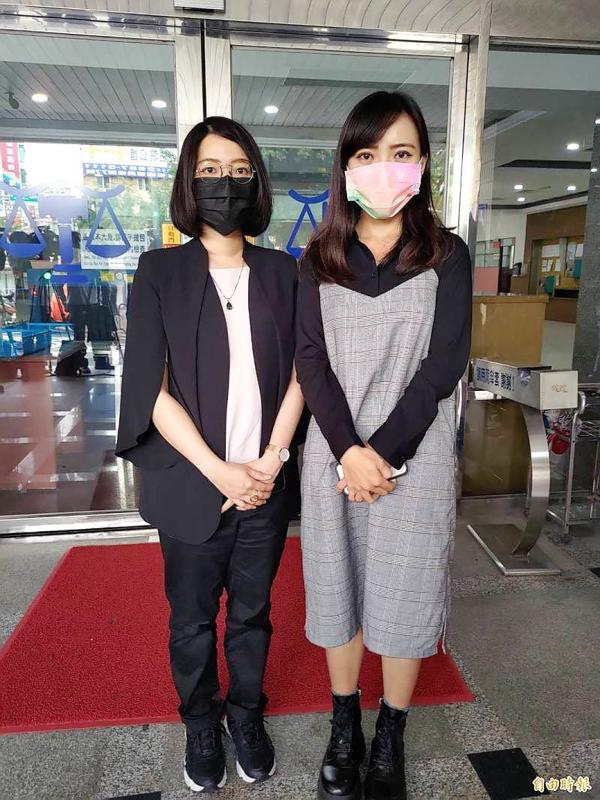Kaohsiung City Councilor Huang Jie (黃捷) yesterday decried lenient sentences in a “deepfake” pornography case, saying that she would seek damages in a civil lawsuit from the convicted creator of the videos, YouTuber Chu Yu-cheng (朱玉宸).
If a civil court grants her damages, she would donate the money to women’s support organizations, she said.
Huang, who is depicted in one of the deepfake videos, said the pertinent laws should be amended to better enable law enforcement agencies to rein in surging sexual abuse on the Internet.

Photo: Wang Ting-chuan, Taipei Times
Huang said that many women have been targeted by creators of deepfake pornographic videos, revenge porn videos and footage secretly filmed using hidden cameras.
“These victims suffer after being traumatized,” she said, adding that Chu being sentenced to five years and six months in prison “cannot repair the psychological damage while the videos he created continue to circulate on the Internet.”
The New Taipei District Court on Thursday convicted Chu, 26, and his assistant, Chuang Hsin-juei (莊炘睿), of producing deepfake pornographic videos depicting 119 women, including politicians, entertainers and celebrities.
Their videos, which they started to produce in 2020, breached the Personal Data Protection Act (個人資料保護法), the court said.
The court also confiscated NT$13.38 million (US$447,252) in illegal income from the videos and fined Chu NT$1.98 million.
Chuang was sentenced to three years and eight months in prison and fined NT$1.32 million.
However, the court decided that the prison terms can be commuted to fines, sparking public outrage over what many said was a too lenient decision.
The rulings can be appealed.
Democratic Progressive Party (DPP) Legislator Kao Chia-yu (高嘉瑜), who is also depicted in Chu’s videos, said the act should be amended to allow for harsher sentences.
“For women who have become victims of deepfake pornography, the suffering can last for a lifetime,” Kao said. “This ruling was too lenient.”
The act is not up to date with today’s technology, she said, adding that deepfake technology not only enables criminals to edit a person into a pornographic video, but also to commit financial crimes or produce fraudulent videos of government leaders to cause political turmoil and breach national security.
Women depicted in Chu and Chuang’s videos also include entertainer Ili Cheng (鄭家純) and YouTuber Zamy Ting (奎丁).
The two offenders promoted the videos through advertising on online platforms, and clips produced for their dedicated YouTube channel and Twitter account, seeking to entice people to pay for a subscription to view the full videos.
Investigators estimated that their income from producing deepfake videos was NT$13.38 million.
Prosecutors indicted the duo in March, charging them for breaching the Personal Data Protection Act, aggravated personal defamation and offenses against sexual morality.
Four women testified against them in court, saying they are suffering mentally since the videos emerged and fear for their personal reputation. Their lawyers requested the judges to impose strong penalties, including a 12-year term for Chu, saying it would act as a deterrent.
Chu and Chuang apologized in court, but the victims did not accept their apologies.
Aside from Huang, 21 other victims have reportedly filed civil lawsuits.
The court said it did not follow the lawyers’ request, as the offenders admitted to producing the videos, apologized, tried to settle the case with the victims and showed “good attitude” during the trial.

Rain is to increase from Wednesday morning as Severe Tropical Storm Kong-Rey approaches, with sea warnings to be issued as early as tomorrow afternoon, the Central Weather Administration (CWA) said today. As of 8am, Kong-Rey was 1,050km east-southeast of the Hengchun Peninsula (恆春) heading in a northwesterly direction toward Taiwan, CWA Forecast Center Director Lin Po-tung (林伯東) said. Rainfall is to increase from Wednesday morning, especially in northern Taiwan and Yilan County, he said. A sea warning is possible from tomorrow afternoon, while a land warning may be issued on Wednesday morning, he added. Kong-Rey may intensify into a moderate typhoon as it passes

Taiwan yesterday issued warnings to four Chinese coast guard vessels that intruded into restricted waters around the Taiwan-controlled Kinmen Islands, according to the Coast Guard Administration (CGA). The four China Coast Guard ships were detected approaching restricted waters south of Kinmen at around 2 pm yesterday, the CGA’s Kinmen-Matsu Branch said in a statement. The CGA said it immediately deployed four patrol boats to closely monitor the situation. When the Chinese ships with the hull numbers "14512," "14609," "14603" and "14602" separately entered the restricted waters off Fuhsing islet (復興嶼), Zhaishan (翟山), Sinhu (新湖) and Liaoluo (料羅) at 3 pm, the Taiwanese patrol

A former member of the US Naval Special Warfare Development Group (DEVGRU), formerly known as SEAL Team 6, said in an interview with Business Insider that the elite unit’s role in a Taiwan Strait conflict would be more limited than some might expect. The report follows an earlier one in September by the Financial Times, which said the “clandestine US Navy commando unit” has been training for missions to help Taiwan if it is invaded by China. “You don’t use a scalpel for a job a hammer can do,” the former Navy Seal said to Business Insider on condition of anonymity.

MUCH-NEEDED: After China demonstrated its capabilities to deploy vertical launching systems, Taiwan needs air defense systems such as NASAMS, a defense expert said The US’ approval of exports of three advanced air defense missile systems to Taiwan signified NATO’s goodwill toward the nation, a Taiwanese defense expert said. The US Defense Security Cooperation Agency on Friday announced the US$1.16 billion sale of the National Advanced Surface-to-Air Missile System (NASAMS) and the US$828 million sale of AN/TPS-77 and AN/TPS-78 radar turnkey systems. The NASAMS is a network that uses ground-launched Air Intercept Missile (AIM)-120 Advanced Medium-Range Air-to-Air Missiles (AMRAAM) to intercept hostile aircraft, drones and cruise missiles. Su Tzu-yun (蘇紫雲), director of defense strategy and resources at the state-funded Institute for National Defense and Security Research, said